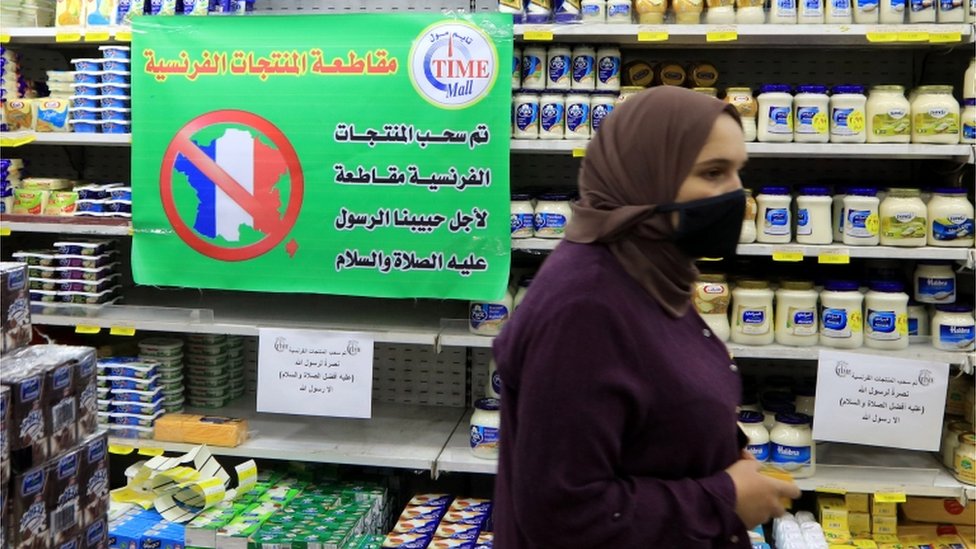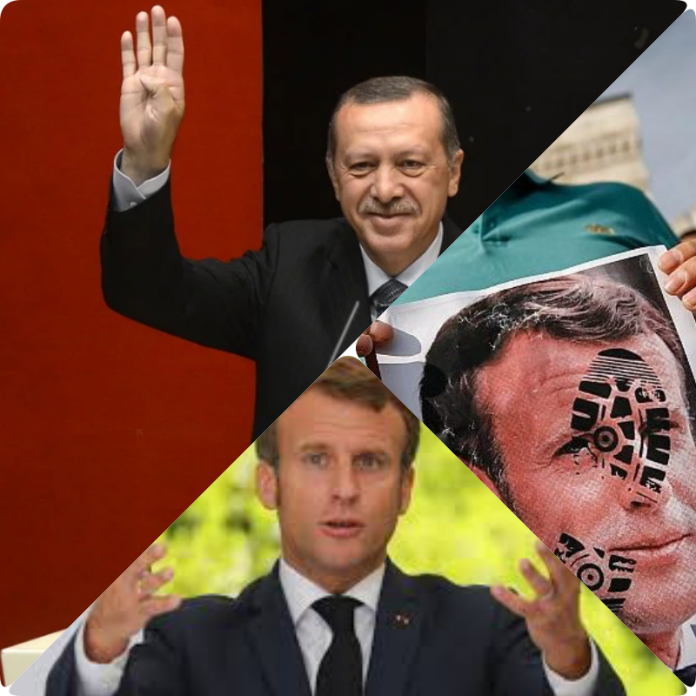Turkish President Recep Tayyip Erdogan has called on Turks to boycott French goods amid a row over France’s tougher stance on radical Islam.
In a televised speech, he urged world leaders to protect Muslims “if there is oppression against Muslims in France”.
Mr Erdogan has angrily criticised French President Emmanuel Macron for pledging to defend secularism against radical Islam.
It comes after a teacher was killed for showing Prophet Muhammad cartoons.
Samuel Paty was beheaded on 16 October by 18-year-old Abdullakh Anzorov outside Paris, after presenting the images to his pupils during a class about freedom of speech.
Mr Macron has paid tribute to Mr Paty, and said France “will not give up our cartoons”.
Depictions of the Prophet Muhammad are widely regarded as taboo in Islam, and are offensive to many Muslims.
But state secularism – or laïcité – is central to France’s national identity. Curbing freedom of expression to protect the feelings of one particular community undermines unity, the state says.
What’s the dispute about?
Mr Erdogan called for the boycott in a televised speech on Monday.
“Never give credit to French-labelled goods, don’t buy them,” he said in the capital Ankara.
He said Muslims are now “subjected to a lynch campaign similar to that against Jews in Europe before World War II”, adding that “European leaders should tell the French president to stop his hate campaign”.
Over the weekend, Mr Erdogan said Mr Macron needed a mental health check for speaking out so forcefully on Islam – comments that caused France to recall its ambassador to Turkey for consultations.
It came after Mr Macron pledged to defend secularism and tackle radical Islam in the wake of the killing of Mr Paty.
Two weeks before the attack, Mr Macron described Islam as a religion “in crisis” and announced new measures to tackle what he called “Islamist separatism”.
France has Western Europe’s largest Muslim population, and some accuse the authorities of using secularism to target them.
What’s been the reaction?
European leaders have come out in support of France. Germany expressed “solidarity” with Mr Macron after the Turkish president’s comments, with government spokesman Steffen Seibert calling the remarks “defamatory” and “completely unacceptable” and foreign minister Heiko Maas calling Mr Erdogan’s personal attacks “a particular low point”.
Dutch Prime Minister Mark Rutte said the Netherlands “stands firmly with France and for the collective values of the European Union”, while Italian Prime Minister Giuseppe Conte also expressed his “full solidarity” with Mr Macron.
“Personal insults do not help the positive agenda that the EU wants to pursue with Turkey,” he wrote in a tweet.
But Turkey is not the only country to criticise Mr Macron’s comments. Pakistan’s Prime Minister Imran Khan accused the French president of “attacking Islam” in a tweet on Sunday, while French products have been removed from some shops in Kuwait, Jordan and Qatar. There have also been protests in a number of countries, including Bangladesh, Iraq, Libya and Syria.

Meanwhile, French footballer Paul Pogba has denied reports that he planned to quit international football over Mr Macron’s comments about Islam.
The Manchester United midfielder dismissed the “total fake headlines” in a post on Instagram and said he was taking legal action against publishers.
Citing Turkey’s statistical institute, Reuters news agency reports that France is the 10th biggest source of imports into Turkey. The French company Renault is reportedly one of the leading car brands by sales in the country.
How are France’s relations with Turkey?
Mr Erdogan’s calls for a boycott come after months of rising tensions between France and Turkey.
While both countries are Nato members, they support differing sides in the ongoing conflict between Armenia and Azerbaijan, as well as in Libya’s civil war.
Mr Macron has also clashed with Mr Erdogan over Turkish oil and gas exploration in disputed waters in the eastern Mediterranean. France deployed jets and a frigate to the region in August amid the tensions.































